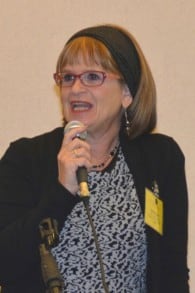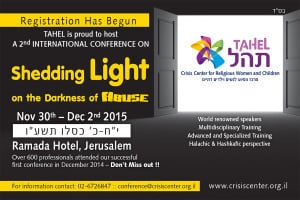Hardly a day goes by without hearing of another case of domestic violence, get refusal, or child sex abuse in the Jewish community. We are all against it, and appalled by what is happening. But is there anything we can do? Debbie Gross, director of the Tahel Crisis Center for Religious Women and Children, thinks so. I spoke by phone with Debbie Gross, about the Center’s second conference, “Shedding Light on the Darkness of Abuse,” scheduled for November 30-December 2 in Jerusalem.
What gave you the idea for a conference?
Debbie Gross: I’ve been working for ten years on the front lines of child sex abuse and domestic abuse. During my travels to Jewish communities around the world, I noticed that they seemed to be reinventing the wheel. I thought that instead of each city or organization developing its own tools and programs, why not get together to share materials and experiences? Of the six hundred people at last year’s conference, 200 came from abroad, including from South Africa, Europe and South America. We were pleased that a third of the attendees were men, a higher proportion than typical for this kind of conference.
What will be new this year?
DG: After last year’s conference, we learned that participants wanted more training in handling abuse. So this year’s conference will have two parts: Attendees on the first day will choose from parallel sessions. On the last two days, they will be able to choose one of six different tracks:
- General public—building safe communities.
- Training for monitors to deal with abuse and harassment in schools and organizations, as required by Israeli law.
- Rabbis and yeshiva staff.
- Lawyers and to’anot rabbaniot (female rabbinic court advocates).
- Two professional tracks on treating trauma, intended for therapists and social workers, and led by experts from the United States.
The training tracks will give participants a chance to share case studies and discuss them. A number of sessions will address the treatment of violent men, and how a community deals with perpetrators and victims. There will be four sessions on the issue of agunah (woman in limbo because she has not been granted a religious divorce). For instance, in the track for lawyers, a panel will share relevant get (religious divorce) laws and policies from around the world.
The legal track will culminate with the forming of a coalition called Yashar. Lawyers belonging to Yashar will promise not to take divorce cases where a man doesn’t agree to give a get. Our goal is that members of Yashar will enjoy a special prestige. Until now, the only legal means of pressuring a man to grant a get was through prenuptial agreements.
Those who attend all three days will receive a certificate, depending on their profession and the track they chose. Lawyers will get CLEs, and social workers and teachers can get hishtalmuyot (continuing education credits).
Can you explain about the training to be a monitor?
DG: The Israeli law prohibiting sexual harassment contains a clause requiring every organization over a certain size to retain an employee trained to monitor abuse. Currently, the law is not enforced, but it may be in the future. A monitor who learns of abuse or harassment will instruct the company on the procedure for handling the complaint. A company that fails to comply can be held liable, civilly or criminally. Participants in our monitor track will receive such a certificate.
An organization can be a company, school, or community. We believe that all organizations should have a monitor, no matter their size.
Where does Tahel’s funding come from?
DG: Twenty percent of our budget comes from the Ministry of Welfare, and the rest comes from projects and donations. We now operate using a business model—building products we can sell. For example, Jewish communities abroad pay us to set up a crisis center and hotline.
Who would you like to see attend the conference this year?
DG: Last year we had mostly professionals in the mental health field. This year, we’d like to see more teachers, guidance counselors, school personnel, and parents—regular parents. We also want to see a lot of rabbis. Rabbis hear about these cases, and they don’t know what to do. Rabbis attending will also learn how to prevent false accusations against them. For instance, it’s not appropriate to email or text with a female congregant at 2 am. The boundaries fall down.
Recently we have seen cases where abuse was not reported to the police. What is Tahel’s policy?
DG: The laws of mandatory reporting will be taught in the conference, along with sessions on how the community handles abuse with the help of the police and government agencies.
Which rabbis in Israel are most supportive of your efforts?
DG: Rabbi Shmuel Eliyahu and Ashkenazi Chief Rabbi David Lau are both very involved in abuse issues. Rabbi Lau will be speaking at the conference, and helped make a video. Rabbi Eliyahu was instrumental in the recent case in Safed, encouraging the victims, who were over 18, to report their cases to the police. In the U.S., a group of rabbis have established a beit din (rabbinic court) for issues of sex abuse.
Where have you seen progress in Israel regarding abuse? Lack of progress?
DG: Tahel is setting up a study day for haredi rabbis. The ministry of religion is training 600 rabbi’s wives, as a result of the last conference. These are important precedents. But there is still a need for more training in religious establishment.
I’d like to see more individual members of the community take responsibility and make sure that schools and synagogues have policies in place. It’s not enough to complain, it’s your job to do something.
To see the complete program and to register, see Tahel’s website and follow Tahel’s Facebook page.
You can also download this brochure with more details.
Posts from last year’s Tahel conference:
Rabbi Blau on False Religious Justifications for Abuse
Violence and Abuse in the Religious Community: Is Religion the Solution or the Problem?


Imho , I think the problem starts with a discipline approach which is punitive rather than helping kids solve problems, engage in an autonomous in restitution and make amend and do teshuvah. A punitive approach gives the parent or teacher power over the life or even body of the child and the slipperly slope to abuse is not far off. Instead of punishment , solve problems and give the kid a vision